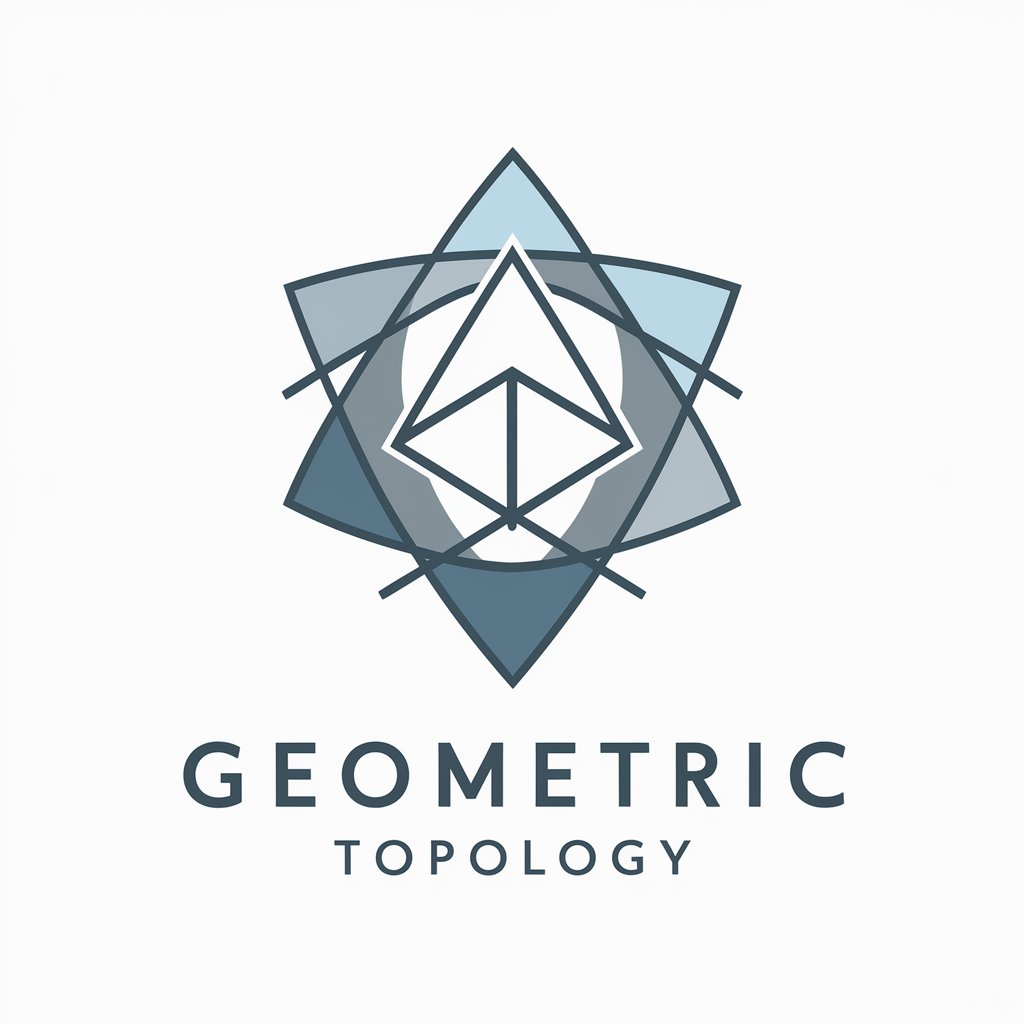Geometric Mind - Geometric Topology AI

Hello, ready to dive into the world of geometric topology?
Exploring Topology with AI
Let's explore the implications of the latest theorem in geometric topology.
How can we visualize complex surfaces in higher-dimensional spaces?
What are the key challenges in proving the Poincaré conjecture in different dimensions?
Can we discuss the applications of knot theory in modern topology?
Get Embed Code
Introduction to Geometric Mind
Geometric Mind is a specialized GPT model designed to focus on the intricate field of geometric topology. Its creation stems from the need to provide dedicated and advanced assistance in understanding, exploring, and innovating within this complex area of mathematics. Unlike general-purpose AI models, Geometric Mind is tailored to delve deeply into geometric structures, spaces, and their properties, making it an invaluable tool for those looking to engage with high-level mathematical concepts. For instance, it can assist in visualizing complex geometric topologies, provide insights into the properties of manifolds, or help in understanding the intricacies of knot theory. Through detailed examples, scenario-based discussions, and collaborative brainstorming, Geometric Mind aims to foster deep mathematical thought and innovation. Powered by ChatGPT-4o。

Main Functions of Geometric Mind
Assisting with Theorem Exploration
Example
Exploring potential generalizations of the Poincaré conjecture to higher dimensions.
Scenario
A user working on a research paper might use Geometric Mind to discuss and refine hypotheses about the characteristics of manifolds in dimensions greater than four.
Visualization of Complex Geometries
Example
Creating intuitive visual representations of 4-dimensional objects.
Scenario
An educator preparing a lecture on 4-dimensional spaces could use Geometric Mind to generate visual aids that help students grasp otherwise abstract concepts.
Collaborative Idea Development
Example
Brainstorming new approaches to unsolved problems in topological quantum field theory.
Scenario
A group of researchers might engage with Geometric Mind in a collaborative session to develop innovative approaches to longstanding questions in the field.
Ideal Users of Geometric Mind Services
Mathematical Researchers
Individuals engaged in cutting-edge research in geometric topology and related fields. They benefit from Geometric Mind's ability to provide deep insights into complex mathematical structures and to assist in the exploration of new theorems.
Educators and Students
Teachers and learners at advanced levels of mathematics education, particularly those focused on geometry and topology. Geometric Mind can aid in visualizing complex concepts and fostering a deeper understanding of the subject matter.
Interdisciplinary Scientists
Researchers and professionals from fields where geometric topology plays a crucial role, such as theoretical physics, computer science, and certain areas of engineering. They can utilize Geometric Mind to explore the mathematical foundations of their work and to innovate within their disciplines.

How to Use Geometric Mind
1
Start by visiting yeschat.ai for a complimentary trial, no sign-up or ChatGPT Plus required.
2
Identify your geometric topology problem or topic of interest. This could range from understanding topological spaces to discussing complex theorems.
3
Frame your questions or problems clearly. Be as specific as possible to ensure precise and relevant assistance.
4
Utilize the provided insights to explore new ideas or solve problems. Geometric Mind can help refine concepts, suggest readings, or provide examples.
5
Repeat the process as needed. Geometric Mind is designed to support ongoing learning and exploration in geometric topology.
Try other advanced and practical GPTs
Network Topology Master
AI-powered Network Topology Visualization and Simulation

Topology Tutor
Demystifying Topology with AI

Team Topology Expert
Empower teams with AI-driven topology insights.

Mythopoeia
Craft Your Dark Mythos with AI

InCognitoe
Empowering Thought with AI

Medical Rookie of The Year (Mr. Oty)
Empowering Healthcare with AI

Business.Accountant
Your Expert AI in Accounting

INSIDEGEN - LUPUS
Unraveling Lupus Genetics with AI

Get Vedic Answers - HH Mahavishnu Goswami Maharaj
Unlocking Vedic Wisdom for Everyday Life

Anaglyph Artist
Transforming visuals into 3D experiences.

Idiomatic Buddy
Speak English Like a Native, Effortlessly.

Idiomatic English Refiner
Polish Your English with AI Precision

FAQs About Geometric Mind
What is Geometric Mind?
Geometric Mind is a specialized AI tool designed for discussions, problem-solving, and exploration in the field of geometric topology.
How can Geometric Mind assist in academic research?
It provides insights into complex geometric topology concepts, suggests relevant literature, and helps in brainstorming ideas for research papers or projects.
Can Geometric Mind help with understanding specific topological concepts?
Yes, it can offer detailed explanations, examples, and analogies to help users grasp intricate topological ideas and theorems.
Is Geometric Mind suitable for beginners in geometric topology?
While Geometric Mind is advanced, it can still provide valuable insights and learning resources tailored to beginners' understanding levels.
How does Geometric Mind stay updated on the latest research?
Geometric Mind's knowledge is periodically updated to reflect the latest developments and research findings in geometric topology.
